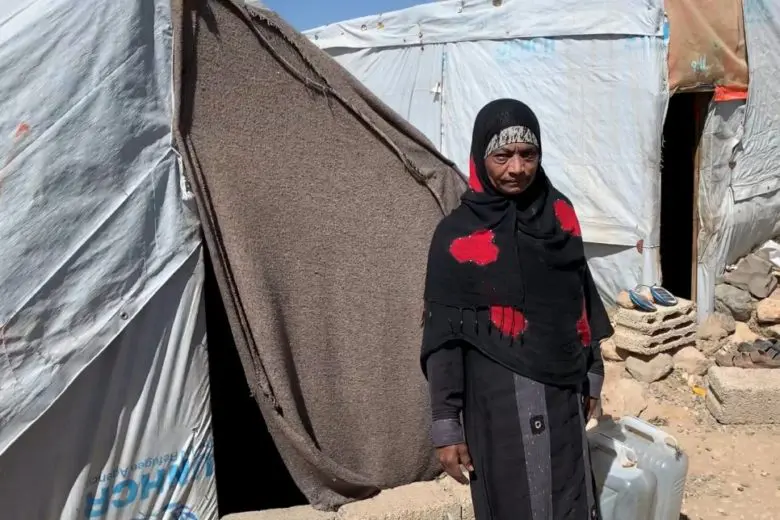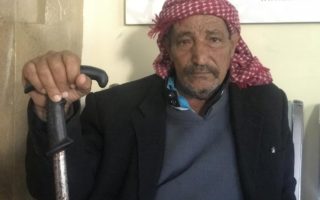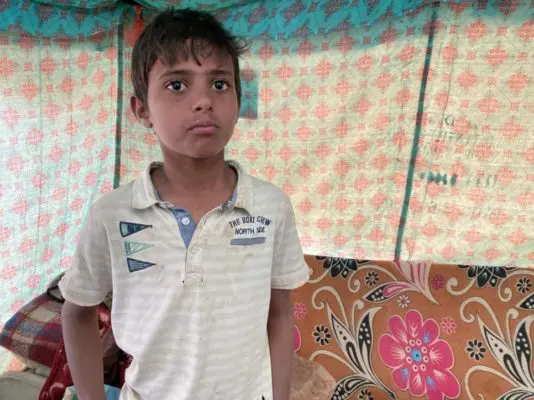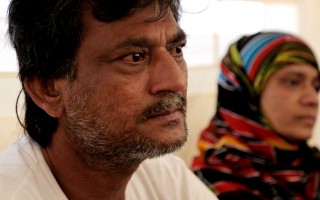
Mariam, 50, goes to collect water at the displacement site in Amran, Yemen, where she struggles to feed and take care of 13 children on her own. © UNHCR/Jean-Nicolas Beuze
Conflict and displacement have compounded centuries of discrimination against Yemen’s Muhamasheen minority, denying access to jobs, documentation and humanitarian aid.
By Jean-Nicolas Beuze
AMRAN, Yemen – It was past noon, the time when Mariam would normally start preparing lunch for her children. But today, she and her extended family of 14 have not yet had their breakfast; the cold firepit in the corner of their tent an unwelcome reminder that they last ate more than a day ago.
“This is where I cook, and this is where we sleep.” Mariam points to a tiny mound of ashes encircled by stones, next to a worn-out rug spread on the floor of the dark, ramshackle shelter. “Most of the time, we only eat once a day. I don’t have fuel or firewood, so we burn plastic bottles and rubbish when we have something to cook,” she said.
Mariam, 50, and her family were forced to flee their home in Sa’ada, north-western Yemen, after the conflict erupted in 2015. She now faces a daily battle for survival alongside 136 other families on a site hosting displaced Yeminis in the Kharif district of Amran governorate, north of the capital Sana’a.
DONATE TO SUPPORT REFUGEES IN YEMEN
A widow with six children of her own, Mariam adopted seven of her nieces and nephews after her brother and his wife were killed in the bombing that forced her to leave home. Undernourished and gaunt, she must now feed and take care of 13 children on her own.
“Most of the time, we only eat once a day.”
While the conflict in Yemen has hit the entire country hard, few have felt the deprivation as keenly as the Muhamasheen, an underclass to which Mariam belongs. The outcast ethnic group dubbed the ‘marginalized ones’ were already suffering the legacy of centuries of discrimination and poverty before fighting broke out in 2015.
The deeply rooted discrimination they face is believed by some to be linked to their ethnic origin as the descendants of African slaves brought to the region in the sixth century. They are mostly confined to slums on the outskirts of towns and cities with few economic opportunities, and lack access to basic services such as water, sanitation and education.
To ease the sense of marginalization surrounding the group, the Sana’a authorities recently renamed them the “grandchildren of Bilal”, after a highly respected historical figure in the Muslim world – a former African slave and close companion of the Prophet Mohammed who led the first call to prayer.
Before she was bombed out, Mariam used to work as housekeeper, sweeping and mopping floors to earn a little money to feed her family. But since fleeing her home she has not been unable to find a job, leaving her unable to afford school supplies or the 12,000 Yemeni rials (approximately US$20) it costs to secure identity documents for most of her children.
“At night it gets very cold.”
As a result, only four are currently enrolled in school. “I have no money to buy them books or uniforms. We hardly have enough to afford one meal a day,” Mariam said. Those that attend lessons must walk five kilometers daily to attend the nearby school.
Mariam doubts that an education will do much to improve their prospects in any case, as Muhamasheens often have few alternatives to menial, low-paid jobs. Her adopted son Hassain, 20, earns a little money by collecting and selling recyclable waste at the Kharif hosting site to supplement what little support they get from aid agencies.
“At night it gets very cold, but we don’t have a blanket for everyone, so one blanket is shared by three,” said Mariam, pointing to a small pile of blankets folded up in one corner of the tent.
Their lack of identity documents and exclusion from any tribal affiliation also means that Mariam and most of her children are often ineligible for food distributions and other forms of humanitarian aid, receiving only a fraction of the assistance they need based on the documents of her four children.
While the actual number of Muhamaseen is not known, estimates range from between half a million to 3.5 million, with most residing in Al Hudaydah, Taizz, Ibb, Lahj, Mahaweet, Hajjah and Hadramout governorates.
Six years of conflict have forced nearly four million Yemenis to flee elsewhere in the county in search of safety. The overwhelming majority (76 per cent) are women and children.
In 2020 alone, some 172,000 people were newly displaced in their homeland, giving Yemen the fourth largest population of internally displaced people (IDPs) in the world
To respond to the waves of fresh displacement and those uprooted for protracted periods inside Yemen, UNHCR, the UN Refugee Agency, is providing emergency assistance including shelter, essential household supplies and cash assistance to the most vulnerable.
UNHCR has provided Miriam and her family with several cash assistance payments, enabling her – and one million other beneficiaries in Yemen – to buy food, and pay for other priorities such as medicines, rent, or repairs to the shelter. UNHCR also provides essential items including mattresses, kitchen sets and shelter building material.
In coordination with partners, it is monitoring the needs of displaced families, including the Muhamaseens. This will help to identify the most vulnerable and ensure their access to humanitarian aid, including access to legal assistance to help obtain identification documents.
Despite this assistance, millions of people in Yemen continue to suffer. Ongoing conflict is leading to a sharp deterioration in living conditions across the country. UNHCR is witnessing a spike in people’s needs, exacerbated by new frontlines, a collapsing economy, diminished social services and a loss of livelihoods.
With the looming threat of famine-like conditions in some parts of the country, data shows that displaced families are particularly at risk of hunger, especially female-headed households like Mariam’s. With the COVID-19 pandemic squeezing incomes and disrupting food supplies, the scale and impact of food insecurity is expected to increase.
Worldwide, an estimated 46 million people had been forced to flee within their own countries’ borders by conflict and persecution by mid-year 2020, accounting for the majority of the world’s 80 million forcibly displaced people.





